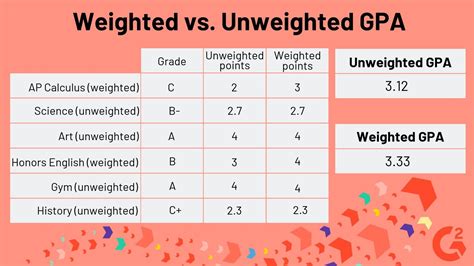Navigating the world of college admissions involves understanding the intricacies of various factors that impact your application, including your grade point average (GPA). Two common types of GPA calculations are weighted and unweighted. Understanding the differences between these two methods and their implications on your college application is crucial. This comprehensive guide will delve into the details of weighted vs. unweighted GPA, providing you with the necessary knowledge to make informed decisions.

What is Weighted GPA?
Weighted GPA is a method of calculating your GPA that assigns different weights to different classes based on their difficulty level. Typically, honors, Advanced Placement (AP), and International Baccalaureate (IB) courses carry more weight than regular courses. This means that earning a higher grade in a weighted class will have a greater impact on your overall GPA than earning the same grade in a regular class.
What is Unweighted GPA?
Unweighted GPA, on the other hand, does not assign any additional weight to honors, AP, or IB courses. All classes are treated equally in the calculation, regardless of their difficulty level. This means that earning a higher grade in any course will have the same impact on your overall GPA.
Weighted vs. Unweighted GPA: Which is Better?
There is no definitive answer to which type of GPA is better. The choice between weighted and unweighted GPA depends on several factors, including your academic strengths, your course selection, and your college aspirations.
**Weighted GPA** can benefit students who consistently excel in challenging classes. It allows them to showcase their academic rigor and demonstrate their ability to handle advanced coursework. Weighted GPA is often preferred by colleges that emphasize academic achievement and rigor.
**Unweighted GPA** can be advantageous for students who may not perform as well in more challenging classes or who have not taken a significant number of honors, AP, or IB courses. It provides a more straightforward representation of your overall academic performance, without any additional weighting based on course difficulty. Unweighted GPA is often preferred by colleges that focus on a more holistic approach to admissions, considering factors beyond just academic achievement.
How to Calculate Weighted and Unweighted GPA
**Weighted GPA** 1. Assign a weight to each course based on its difficulty level. Common weight values are: – Regular courses: 1.0 – Honors courses: 1.1 or 1.2 – AP/IB courses: 1.3 or higher 2. Multiply your grade in each course by its weight. 3. Add up the weighted grades for all your courses. 4. Divide the sum by the total number of courses taken. **Unweighted GPA** 1. Sum up your grades in all your courses. 2. Divide the sum by the total number of courses taken.
Where to Find Your GPA
You can usually find your GPA on your high school transcript. Your school may provide both weighted and unweighted GPA calculations. If your transcript does not include your GPA, you can calculate it yourself using the steps outlined above.
Common Mistakes to Avoid
– **Assuming that weighted GPA is always better.** While weighted GPA can benefit some students, it may not be the best option for everyone. Consider your individual strengths and college aspirations when making your decision. – **Overestimating your weighted GPA.** Some schools may recalculate your weighted GPA using their own weighting system. Make sure to check with the colleges you are applying to for their specific GPA calculation policies. – **Not taking challenging courses.** While it may seem tempting to stick to regular courses to boost your unweighted GPA, taking challenging courses can demonstrate your academic rigor and prepare you for college-level work. – **Ignoring your unweighted GPA.** Even if you have a high weighted GPA, colleges will still consider your unweighted GPA as part of their admissions process. Ensure that your unweighted GPA is also strong.
Effective Strategies
– **Choose your courses wisely.** If you are considering a weighted GPA, select challenging courses that you are confident you will perform well in. – **Work hard in all your classes.** Regardless of the type of GPA calculation you choose, it is important to maintain high grades in all your courses. – **Consider taking summer school courses.** Summer school can provide an opportunity to improve your GPA or take additional challenging courses. – **Get extra help when needed.** If you are struggling in a particular course, don’t hesitate to seek extra help from your teacher or a tutor.
Pros and Cons of Weighted vs. Unweighted GPA
**Pros:** – Weighted GPA: – Rewards students for taking challenging courses. – Can boost your overall GPA if you excel in honors, AP, or IB courses. – Unweighted GPA: – Provides a more straightforward representation of your overall academic performance. – May be preferred by colleges that focus on a more holistic approach to admissions.
**Cons:** – Weighted GPA: – Can be misleading if you do not perform well in challenging courses. – May not be recognized by all colleges. – Unweighted GPA: – Does not reward students for taking challenging courses. – May not accurately reflect your academic potential if you have not taken many honors, AP, or IB courses.
Conclusion
Understanding the differences between weighted and unweighted GPA is essential for making informed decisions about your college application strategy. Consider your individual strengths, your course selection, and your college aspirations when choosing which type of GPA is right for you. By carefully considering the pros and cons of each method, you can optimize your GPA and improve your chances of success in the college admissions process.
